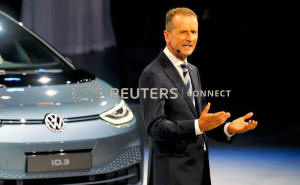VW CEO shifts strategy from empire building to efficiency
 Send a link to a friend
Send a link to a friend
 [September 14, 2019] FRANKFURT
(Reuters) - Volkswagen <VOWG_p.DE> has abandoned its decades-old
obsession with empire building and no-expense-spared engineering to free
up resources for the development and mass production of electric cars,
its CEO Herbert Diess told Reuters. [September 14, 2019] FRANKFURT
(Reuters) - Volkswagen <VOWG_p.DE> has abandoned its decades-old
obsession with empire building and no-expense-spared engineering to free
up resources for the development and mass production of electric cars,
its CEO Herbert Diess told Reuters.
A global clampdown on toxic exhaust fumes has triggered a new wave of
consolidation in the auto industry as carmakers look for ways to slash
development costs for low-emission and self-driving technologies.
While rivals such as FiatChrysler and Renault explore a $35 billion deal
to bulk up, Volkswagen is taking the opposite approach: slimming down.
"We don't need more brands. With very few exceptions we can tap the
world's large profit segments with our existing brands," Chief Executive
Herbert Diess told Reuters at the Frankfurt auto show.
VW is spending 80 billion euros ($88.55 billion) to buy battery cells
and develop electric cars and has struck a broad alliance with Ford to
help share development and manufacturing costs.

Volkswagen grew into a multi-brand empire under the leadership of
Ferdinand Piech, the company's chief executive and chairman between 1993
and 2015, whose aggressive expansion resulted in the acquisition of
Bentley, Bugatti and Lamborghini in a single year.
Today the German company has 660,000 employees and owns the Seat, Skoda,
Bentley, Bugatti, Lamborghini, Porsche, Ducati and Audi brands in
addition Scania, MAN and VW.
EYE ON COST
Piech, who passed away last month, took pride in emphasizing engineering
brilliance ahead of earnings, a culture which caused VW's profitability
to lag behind rivals such as Toyota and Peugeot.
Diess told Reuters that creating the best product without regard to
costs is a perilous strategy in today's world, given the task of
overhauling combustion engines at the same time as developing new
technologies.
"The product experience needs to be right. But you need to keep an eye
on cost. You cannot run the business by focusing only on product," Diess
told Reuters.
[to top of second column] |

Herbert Diess, CEO of German carmaker Volkswagen AG, gestures in
front of an ID.3 pre-production prototype during the presentation of
Volkswagen's new electric car on the eve of the International
Frankfurt Motor Show IAA in Frankfurt, Germany September 9, 2019.
REUTERS/Ralph Orlowski

"There are several examples where this has failed. Look at Borgward, they had by
far the best products, but they disappeared," Diess said, referring to a company
which made popular passenger cars in the 1950s. Borgward filed for bankruptcy in
1961 and was revived by Chinese investors in 2015.
This week European auto leaders warned that a new emissions clampdown threatens
jobs and profits after the European Union forced carmakers to slash carbon
dioxide emissions by 37.5% between 2021 and 2030. This comes in addition to a
40% cut in emissions between 2007 and 2021.
Frank Witter, the company's chief financial officer said he wants to raise
profitability to help shoulder the emissions clampdown by slimming down, rather
than bulking up the car and truck maker.
"Reducing complexity has its value in terms of the overall group structure,"
Witter said in an interview at the company's headquarters in Wolfsburg.
"In the past, strategy was reduced to 10 million retail sales and overtaking
Toyota," Witter said. Last year, Volkswagen sold 6.2 million passenger cars.
VW has begun dismantling Piech's empire, selling some assets, including
transmissions and bearings manufacturer Renk, MAN Energy Solutions, and listing
trucks maker Traton earlier this year.
Volkswagen is still reviewing its assets and products in its drive to increase
profits, Witter told Reuters.
"There are other things we certainly could think about, but I continue to
refrain from speculation because that makes things more complicated."
(Reporting by Edward Taylor, Jan Schwartz and Joe White, Editing by Louise
Heavens)
[© 2019 Thomson Reuters. All rights
reserved.] Copyright 2019 Reuters. All rights reserved. This material may not be published,
broadcast, rewritten or redistributed.
Thompson Reuters is solely responsible for this content. |